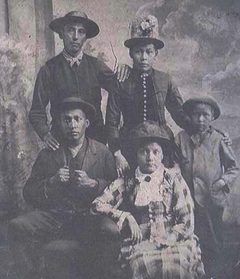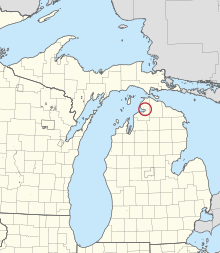
Emmet County is a county located in the U.S. state of Michigan. It is the northernmost county in the Lower Peninsula. As of the 2020 census, the population was 34,112, making it the second-most populous county in Northern Michigan. The county seat is Petoskey, which is also the county's largest city.

Charlevoix County is a county in the U.S. state of Michigan. The county seat is Charlevoix, and the largest city is Boyne City. Located in the Northern Lower Peninsula, Charlevoix County is bisected by Lake Charlevoix, Michigan's third largest inland lake. As of the 2020 census, the county's population was 26,054.
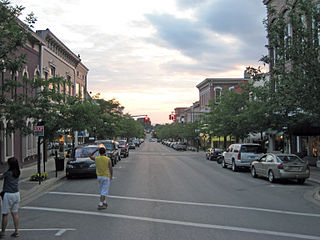
Petoskey is a city in the U.S. state of Michigan. It is the county seat of Emmet County, and is the largest settlement within the county. Petoskey has a population of 5,877 at the 2020 census, up from 5,670 at the 2010 census.
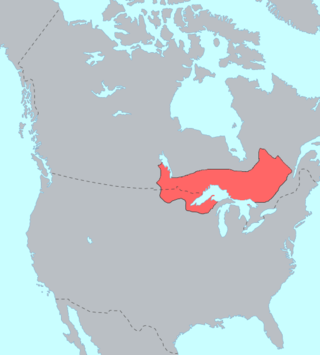
The Ojibwe, Ojibwa, Chippewa, or Saulteaux are an Anishinaabe people in what is currently southern Canada, the northern Midwestern United States, and Northern Plains. They are Indigenous peoples of the Subarctic and Northeastern Woodlands.
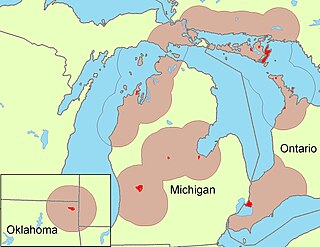
The Odawa are an Indigenous American people who primarily inhabit land in the Eastern Woodlands region, now in jurisdictions of the northeastern United States and southeastern Canada. Their territory long preceded the creation of the current border between the two countries in the 18th and 19th centuries.

Little Traverse Bay is a small open bay of Lake Michigan. Extending about 10 miles (16 km) into the Lower Peninsula of Michigan, much of the head of the land surrounding Little Traverse Bay, and has become part of the urban areas of Petoskey and Harbor Springs. Little Traverse Bay primarily lies within Emmet County, although a small portion lies within Charlevoix County.
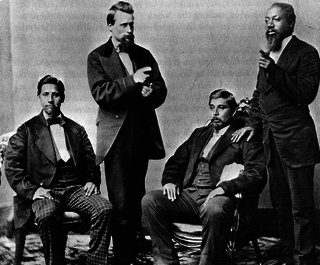
Blood quantum laws or Indian blood laws are laws in the United States that define Native American status by fractions of Native American ancestry. These laws were enacted by the federal government and state governments as a way to establish legally defined racial population groups. By contrast, many tribes do not include blood quantum as part of their own enrollment criteria.

The Grand Traverse Band of Ottawa and Chippewa Indians is a federally recognized Native American tribe located in northwest Michigan on the Leelanau Peninsula. Sam McClellan is the current tribal chairman, elected in June 2016 to a four-year term after succeeding Al Pedwaydon, who served from 2012 to 2016.
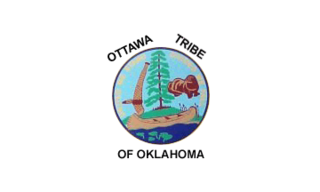
The Ottawa Tribe of Oklahoma is one of four federally recognized Native American tribes of Odawa people in the United States. Its Algonquian-speaking ancestors had migrated gradually from the Atlantic coast and Great Lakes areas, reaching what are now the states of Michigan and Ohio in the 18th century. In the late 1830s the United States removed the Ottawa to west of the Mississippi River, first to Iowa, then to Kansas in what was Indian Territory.
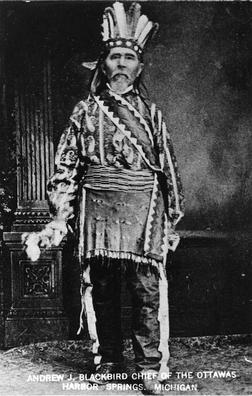
Andrew Jackson Blackbird, also known as Makade-binesi, was an Odawa (Ottawa) tribe leader and historian. He was author of the 1887 book, History of the Ottawa and Chippewa Indians of Michigan.
The Lake Superior Chippewa are a large number of Ojibwe (Anishinaabe) bands living around Lake Superior; this territory is considered part of northern Michigan, Wisconsin, and Minnesota in the United States. They migrated into the area by the seventeenth century, encroaching on the Eastern Dakota people who had historically occupied the area. The Ojibwe defeated the Eastern Dakota, who migrated west into the Great Plains after the final battle in 1745. While they share a common culture including the Anishinaabe language, this highly decentralized group of Ojibwe includes at least twelve independent bands in the region.
Anishinaabe tribal political organizations are political consortiums of Anishinaabe nations that advocate for the political interests of their constituencies. Anishinaabe people of Canada are considered as First Nations, and of the United States as Native Americans.

Little River Band of Ottawa Indians is a federally recognized Native American tribe of the Odawa people in the United States. It is based in Manistee and Mason counties in northwest Michigan. It was recognized on September 21, 1994.
Petosegay or Biidassige was a 19th-century Odawa merchant and fur trader. Both present-day Petoskey, Michigan, Petoskey State Park, and nearby Emmet County park Camp Petosega are named in his honor. A particular variety of stone was found in abundance on his former lands and named after him, and the Petoskey stone was designated as the official state stone. His granddaughter, Ella Jane Petoskey, was asked by Michigan Governor George W. Romney to be an honored signatory on the bill assigning the Petoskey Stone as the state stone.
Same-sex marriage has been legal in Michigan since the U.S. Supreme Court's ruling in Obergefell v. Hodges on June 26, 2015. The U.S. state of Michigan had previously banned the recognition of same-sex unions in any form after a popular vote added an amendment to the Constitution of Michigan in 2004. A statute enacted in 1996 also banned both the licensing of same-sex marriages and the recognition of same-sex marriages from other jurisdictions.
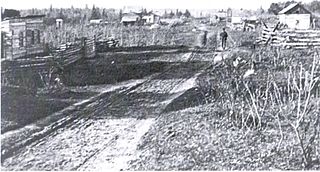
The Burt Lake Burn-Out was a forced relocation of the Burt Lake Band of Chippewa and Ottawa Indians in northern Michigan's "Tip of the Mitt" region on 15 October 1900. On that day a sheriff and his deputies burned down the band's village at the behest of a local land developer who claimed to have purchased the village land parcels for back taxes.

The Mackinac Bands of Chippewa and Ottawa Indians is a state recognized tribe of Ojibwe and Odawa Native Americans, based in the state of Michigan. The tribe is headquartered in St. Ignace, Mackinac County and has around 4,000 enrolled members. Today most tribal members live in Mackinac, Chippewa, Emmet, Cheboygan, and Presque Isle counties, however many tribal members are also located throughout the state of Michigan and the United States.
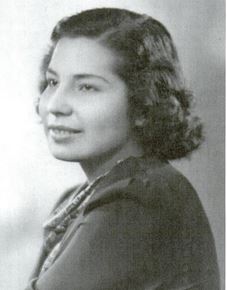
Waunetta McClellan Dominic was an Odawa rights activist who spent her career advocating for the United States government to adhere to its treaty obligations to Native Americans. She was one of the founders of the Northern Michigan Ottawa Association and her influence was widely recognized, especially after winning a 1971 claim against the government for compensation under 19th-century treaties. She was also a proponent of Native American fishing rights being protected. In 1979, she was named by The Detroit News as "Michiganian of the Year" and in 1996, she was posthumously inducted into the Michigan Women's Hall of Fame.
The Treaty of Detroit of 1855 was a treaty between the United States Government and the Ottawa and Chippewa Nations of Indians of Michigan. The treaty contained provisions to allot individual tracts of land to Native people consisting of 40-acre (16 ha) plots for single individuals and 80-acre (32 ha) plots for families, outlined specific tracts which were assigned to the various bands and provided for the severance of the government consolidation of the Ottawa and Chippewa.

